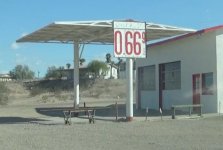Back in 2018 gas was around $2.60 in Houston. The most we paid that trip was around $3.50 in Las Vegas.
In 2022 the cheapest I found was just under $3.00 in a small place in Arkansas. The average was around $3.40.
Here at home we are running around $2.65 per litre (NZ $ worth around 60 US cents today) and I am paying a premium (around $2.80/litre) for the 95 octane I have to run (or I void my warranty) on our 2023 MG.
I just wish I could find a gas station anywhere that still had gas at the price in the pic.
(Pic taken at an abandoned Phillips 66 on the Oatman Highway (old Route 66) in AZ).
In 2022 the cheapest I found was just under $3.00 in a small place in Arkansas. The average was around $3.40.
Here at home we are running around $2.65 per litre (NZ $ worth around 60 US cents today) and I am paying a premium (around $2.80/litre) for the 95 octane I have to run (or I void my warranty) on our 2023 MG.
I just wish I could find a gas station anywhere that still had gas at the price in the pic.
(Pic taken at an abandoned Phillips 66 on the Oatman Highway (old Route 66) in AZ).

